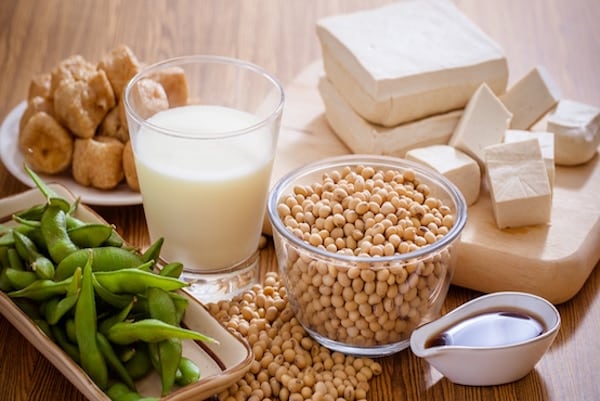If you’re looking for an alternative to HRT or just wanting to manage your symptoms naturally, phytoestrogens could be your new best friend!
Phytoestrogens are natural plant compounds that are structurally similar to human oestrogen and can mimic the action of oestrogen in the body.
This is particularly useful in menopause as you can trick the body into thinking you have enough circulating oestrogen and reduce many of the symptoms associated with falling levels.
OR modulate high oestrogen levels that may be due to perimenopausal fluctuations.
You can watch the video below or listen to the podcast (episode 98).
What foods contain phytoestrogens?
There are many types of phytoestrogens but the most significant for menopause symptoms are the isoflavones, most commonly found in soy products, and lignans, most commonly found in flaxseeds.
Although they are only about one-thousandth as potent as human oestrogen (and body identical HRT), research shows they can help soothe menopausal symptoms and also protect against heart disease and osteoporosis. They may also help lower your risk of hormone-related cancers.
How do they work?
Phytoestrogens work by latching on to our oestrogen receptors. By doing that, they have an oestrogenic effect, helping to balance levels in the body. Their behaviour depends on your biological levels of oestradiol, the main oestrogen in women.
If levels are high, they can help to regulate them and this can help with PMS, heavy or painful periods – and help to reduce the risk of oestrogen driven conditions like fibroids, endometriosis and breast or ovarian cancers.
Equally, as oestrogen levels start to drop at menopause, phytoestrogens can help to increase your levels naturally. This can help ease hot flushes and night sweats, and protect against osteoporosis, dementia and heart disease in the long-term.
Natural phytoestrogens are the body’s preferred source of oestrogen next to naturally produced forms. That means they will beat toxic estrogens to the oestrogen receptor site.
This is great news but of course, you still need to make sure you're eating a nutrient-dense diet, getting lots of rest and relaxation, maintaining a hormone balancing exercise plan and ensuring minimal exposure to hormone-disrupting chemicals so that all your Feisty 4 hormones are behaving!
What are the benefits of phytoestrogens?
There have been many studies on the benefits of phytoestrogens. These include;
- Reduce menopausal hot flushes
- Prevent bone loss, protecting against osteoporosis
- Regulate cholesterol levels
- Normalise blood glucose levels
- Regulate the menstrual cycle
- Help prevent oestrogen-dependent cancers (breast, ovarian, prostate)
- Improve brain fog and memory loss
How to include them in your diet
There are lots of sources of phytoestrogens, but the 2 that are most researched and effective are soy and flaxseeds.
Soy – it’s important to avoid any GM soy, so always buy organic where possible (eg good brands are Sojade, Provamel). Here are some ideas;
- organic unsweetened soy milk
- organic soy natural yoghurt
- organic tofu and tempeh
- edamame beans
- miso
Some people are intolerant to soy, so if you have any reaction when eating soy, do stop! You can always try supplements (see below).
Flaxseeds (or linseeds) = 1-2 tbsp per day (milled to get the lignans)
- sprinkle on yoghurt
- put in your smoothie
- make some flaxseed crackers
- sprinkle on salads or soups
Other sources of phytoestrogens;
- chickpeas and hummus
- sesame seeds
- pumpkin seeds
- legumes
- dried apricots
- alfalfa sprouts
- mung beans
- rye bran
AND…….
- dark chocolate (yay!!)
Supplements
If you can't take get enough phytoestrogens in your diet, certain supplements can help, in particular ones containing isoflavones (red clover extract is a particularly good one).
When Feel asked me to help them formulate their new Menopause supplement, this was the first ingredient I wanted to put in there! Along with other powerful botanicals such as sage, Siberian ginseng, Maca and some key B vitamins, it's designed to support some of the common symptoms of menopause (please don't take if you're on HRT and check with your doctor regarding other medications).
If you want some personalised help, contact us to find out more about our testing and 1-1 support.

